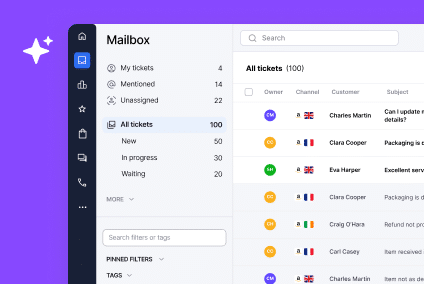The mobile commerce revolution has fundamentally transformed how UK consumers shop and expect customer service. With mobile commerce (m-Commerce) accounting for 55% of all eCommerce sales in the UK as of 2024, businesses can no longer treat mobile commerce UK support as an afterthought. Today’s smartphone shoppers UK demand seamless, instant, and personalised support experiences that match the convenience of their mobile shopping journey.
As eCommerce customer experience becomes increasingly mobile-centric, brands must understand the unique challenges and opportunities of serving customers on smaller screens and in on-the-go contexts.
The Scale of Mobile Commerce in the UK
The numbers reveal mobile commerce dominance in the UK market. Mobile commerce sales reached £96 billion in 2024, with projections to exceed £109 billion by 2027. This growth stems from widespread smartphone adoption, with nearly 100% of individuals aged 16-54 owning smartphones and 98% of adults aged 16-24 embracing mobile technology.
Mobile shopping behaviour is equally impressive. Smartphones account for 78% of retail website visits and generate 75% of online shopping orders in the UK. Additionally, smartphone conversion rates are 64% higher than desktop rates, indicating that mobile users complete purchases more readily when provided with seamless experiences.
Understanding Mobile Customer Behaviour
Mobile shoppers exhibit distinct patterns that influence their customer service needs. Shopping happens in micro-moments throughout the day, often requiring immediate assistance during the checkout process. Unlike desktop users who research extensively, mobile customers need real-time guidance to complete purchases quickly.
Modern UK consumers expect seamless transitions between channels, discovering products on social media, researching on mobile, and seeking support across multiple touchpoints. This omnichannel behaviour demands integrated customer service approaches that maintain context across all interactions.
Essential Mobile Customer Service Strategies
Responsive Design Foundation
Every customer service touchpoint must optimise for mobile devices through touch-friendly interfaces, streamlined content for small screens, fast loading times, and intuitive navigation. True mobile optimisation goes beyond accessibility to create genuinely mobile-native experiences.
In-App Messaging Excellence
Mobile apps achieve conversion rates three times higher than mobile websites, making app support crucial. Effective strategies include contextual help integration at friction points, rich media support for visual issue communication, and persistent chat sessions that maintain conversation history across app navigation.
SMS Support Integration
SMS remains powerful for mobile commerce UK support, providing immediate, low-friction communication. Effective SMS support includes order confirmations, proactive issue notifications, quick resolution links, and appointment scheduling for complex problems.
Mobile Payments UK Considerations
The UK’s mobile payments landscape is evolving rapidly, with mobile wallets expected to comprise over 50% of global eCommerce payment preferences by 2024. This creates specific support requirements, including payment method expertise across Apple Pay, Google Pay, and emerging digital wallets, security-first communication protocols, and real-time payment issue resolution to prevent cart abandonment.
AI and Automation for Mobile Support
Artificial intelligence (AI) dominates customer service trends, with 65% of support decision-makers investing in chatbots for enhanced efficiency. Mobile commerce benefits particularly from 24/7 AI availability, instant query resolution for common questions, and seamless escalation to human agents when needed. 95% of organisations with AI report cost and time savings whilst improving customer satisfaction.
App Support Best Practices
With 54% of mobile commerce payments occurring in apps, dedicated app support requires specialised attention. Key practices include comprehensive in-app help centres, strategic push notification usage for support communications, and proactive app store review management as part of customer service strategy.
Measuring Success and Overcoming Challenges
Mobile customer service success requires specific metrics reflecting mobile user behaviour. 90% of customers expect query responses within 10 minutes, with mobile users demanding even faster responses. Track mobile-specific satisfaction scores and conversion impact metrics to measure effectiveness.
Common challenges include screen size limitations requiring information breakdown into sequential steps, connectivity issues demanding graceful session handling, and multitasking contexts where support must accommodate interruptions and easy re-engagement.
Future Trends Shaping Mobile Support
Several developments will influence mobile customer service evolution. 20% of mobile shoppers are expected to use voice commands for purchases by 2025, requiring voice-based support preparation. 34% of UK eCommerce businesses plan AR and VR implementation, creating new technical support categories. Additionally, 56% of UK consumers will purchase through social media channels, extending customer service into social platforms.
Building Mobile-First Support Teams
Excellence requires strategic team development through mobile-native training, technical proficiency in mobile-specific issues, and empathy for mobile shopping contexts. Support agents need a hands-on mobile experience to understand customer pain points and provide relevant assistance in suboptimal conditions.
Business Impact of Mobile Service Excellence
Superior mobile customer service delivers measurable returns. 80% of customers rate experience as important as products, whilst 77% of business leaders recognise personalised service increases retention. For mobile commerce specifically, every friction point significantly impacts revenue, given the higher conversion potential.
Conclusion
The UK mobile commerce revolution demands a corresponding customer service evolution. As mobile commerce reaches unprecedented scale with billions in annual sales, businesses must prioritise mobile-optimised support, matching customer expectations for convenience and effectiveness.
Success requires understanding mobile shopping context, implementing appropriate technologies like responsive chat solutions, and preparing teams for mobile interaction challenges. Businesses mastering mobile customer service will capture a larger market share while building essential customer loyalty. Creating mobile apps represents just one element – the entire customer service experience must be equally mobile-native.
Transform your mobile commerce customer service strategy today and unlock the UK mobile shopping revolution’s full potential. Try eDesk for free today and find out how our mobile-responsive platform can elevate your customer service to match your mobile commerce ambitions.




